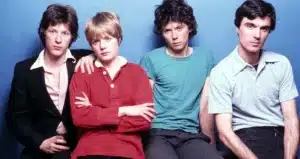Pulp: Chroniclers of the Ordinary, Heroes of the Outsiders
Pulp is a British band formed in Sheffield in 1978, known for their unique blend of art rock, disco, pop, and post-punk, as well as the brilliant, literate songwriting of their frontman Jarvis Cocker. Though they spent much of the 1980s in obscurity, they became one of the defining voices of the Britpop era in the 1990s—offering a sharp, witty, and often melancholic contrast to the laddish bravado of contemporaries like Oasis and Blur.
At their peak, Pulp fused kitsch and class, glamour and grime, creating music that was equal parts kitchen-sink realism and theatrical flair. Their songs explored the awkward corners of desire, working-class life, voyeurism, and British identity—always delivered with Jarvis Cocker’s arch, self-aware charisma.
Pulp. Formation and Background
- Formed: 1978, Sheffield, England
- Founder: Jarvis Cocker – Vocals, lyrics, visual concept
- Early iterations saw constant lineup changes, with only Cocker as the enduring member
- Stable ‘classic’ lineup formed in the early 1990s:
- Jarvis Cocker – Vocals
- Mark Webber – Guitar
- Steve Mackey – Bass (passed away in 2023)
- Candida Doyle – Keyboards
- Nick Banks – Drums
- Russell Senior – Violin, guitar (until 1997)

Pulp. Musical Style
Pulp’s style is difficult to pin down but rich with influences:
- Post-punk and synthpop in their early years
- Glam rock and disco grooves fused with storytelling in their peak period
- Orchestral flourishes and lounge kitsch layered with ironic grandeur
- Emphasis on Jarvis’s lyrics, which were theatrical, erotic, uncomfortable, and deeply human
The band’s sound was as eccentric and stylish as their image, shifting between dancefloor-ready anthems and emotionally devastating ballads.
Pulp. Key Albums
His ‘n’ Hers (1994)
Pulp’s breakthrough, blending sexual politics, synthpop, and the claustrophobia of British suburbia. It’s playful, seductive, and bursting with character.
Highlights:
- “Do You Remember the First Time?”
- “Babies”
- “Lipgloss”
Different Class (1995)
Their masterpiece and a Britpop landmark. This album is razor-sharp social commentary wrapped in glamour, touching on class, voyeurism, hedonism, and disillusionment. It debuted at No. 1 in the UK.
Highlights:
- “Common People” – A scathing and iconic critique of class tourism
- “Disco 2000” – Nostalgic pop perfection
- “Mis-Shapes” – An anthem for outcasts
- “Something Changed” – Romantic and profound
This Is Hardcore (1998)
A darker, more cinematic follow-up. This Is Hardcore examines fame, addiction, lust, and midlife regret, with lush production and a bitter tone.
Highlights:
- “This Is Hardcore” – A dark, lounge-inspired epic about pornography and fame
- “Help the Aged”
- “A Little Soul”
- “Dishes”
We Love Life (2001)
Produced by Scott Walker, this album is pastoral, reflective, and less cynical. It’s Pulp at their most mature and environmentally attuned.
Highlights:
- “The Trees”
- “Sunrise”
- “Weeds II (The Origin of the Species)”
Separations (1992)
An important transitional album, marking their shift from gothic synthpop to the literate disco-rock that would define them.
Highlights:
- “My Legendary Girlfriend”
- “Love is Blind”
- “Don’t You Want Me Anymore?”
Pulp. Lyrical Themes
Jarvis Cocker’s lyrics are among the most acclaimed in British music, often blending irony with empathy. Common themes include:
- Class and social mobility
- Sexual longing, awkwardness, and voyeurism
- Urban boredom and suburban decay
- Identity, exclusion, and coming of age
- The absurdity and sadness of everyday life
Cocker often writes from the perspective of the outcast, the peeper, the frustrated dreamer, making Pulp’s music deeply relatable to anyone who’s ever felt out of place.
Pulp. Cultural Impact and Legacy
- Pulp became cultural icons during Britpop, offering a witty, intelligent, and anti-macho alternative
- “Common People” is widely regarded as one of the greatest British songs ever written
- Jarvis Cocker’s stage presence—equal parts librarian and provocateur—made him an unlikely sex symbol and national treasure
- Cocker famously stormed the stage at the 1996 BRIT Awards, protesting Michael Jackson’s messianic performance
- Though less prolific than some contemporaries, Pulp’s influence has endured across indie pop, art rock, and post-Britpop lyricists
Later Years and Reunions
- Pulp disbanded in 2002 after We Love Life, with Cocker pursuing a solo career
- The band reunited in 2011 for a series of triumphant live shows and festivals, re-establishing their status as cult heroes
- In 2023, Pulp reunited again for UK and European shows—though without the late Steve Mackey
Where to Start
| Album | Year | Best For |
|---|---|---|
| Different Class | 1995 | Their defining album—clever, catchy, and vital |
| His ‘n’ Hers | 1994 | Seductive, synthy, and gloriously awkward |
| This Is Hardcore | 1998 | Cynical beauty with lush, brooding textures |
| We Love Life | 2001 | A more mature and meditative take on life’s quiet dramas |
| Separations | 1992 | For fans of early Pulp and synth-heavy atmospheres |
Final Thoughts
Pulp are the great storytellers of British suburbia, crafting music that is both emotional and ironic, romantic and grotesque. With Jarvis Cocker’s keen observational eye and a knack for turning ordinary moments into epic pop dramas, they remain one of the most intelligent and emotionally resonant bands of their generation.
For those who love music that’s self-aware, theatrical, and richly poetic, Pulp is not just essential—they’re sublime outsiders who made awkwardness sound glamorous.
External Links
https://pulp.roughtraderecords.com/




